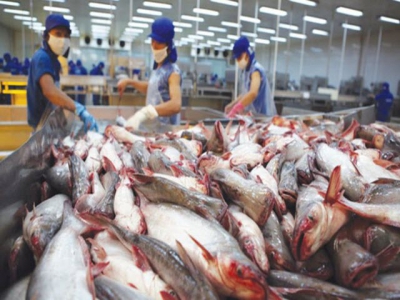Vietnam could face pangasius oversupply

Pangasius export sector was probably the most improved industry this year, but rampant production could lead to excess supplies and price drops, according to Việt Dragon Securities Company (VDSC).
Many farmers have rushed to breed pangasius after prices increased steadily from the beginning of 2017 due to fingerling and raw materials shortages. The situation may lead to oversupply of raw materials when farms step into the harvest season. The selling price of raw fish for factories could be reduced, the company said.
Farms could suffer great losses and stop breeding pangasius for the next season, meaning they would lack raw materials for the next crop, VDSC warned. However, according to the firm, if the US-China trade war continues, Việt Nam could increase its market share in the US, replacing Chinese tilapia that currently accounts for 40 percent of all fish imports to the US.
Barriers to Vietnamese pangasius in the US market are likely to decrease. Vietnam has passed the US Department of Agriculture (USDA) field tests – the most important step in the assessment process established by the USADA’s Food Safety and Inspection Service (FSIS). In addition, the preliminary anti-dumping tax on basa fish during the 14th administrative review period (POR 14) is significantly lower than that of POR 13. As a result, VDSC expects pangasius export volume to the US market to increase sharply this year.
The Vietnam – EU Free Trade Agreement (EVFTA) may be approved early this year. If EVFTA is approved, the import tariff for frozen pangasius fillets will be reduced from the current rate of 5.5 per cent to zero within three years. The rate for processed pangasius fillets will be reduced from 7 per cent to zero within seven years. VDSC said demand for pangasius in the EU is expected to rise.
With the popularity of processed products in the US and EU markets, Việt Nam has the potential to increase its profits from high-value products. The gross margin for the products is 22-25 per cent, higher than the margin of 12-16 per cent for frozen fillets.
Việt Nam’s Mekong Delta region has favourable ecological conditions for large-scale pangasius farming. The natural conditions combined with advanced farming technology will produce white-meat products, a favourite choice of consumers. Other major pangasius producers such as India, Bangladesh, Thailand and Indonesia produce low-value yellow-meat tra fish.
Related news
 City farmers struggle to sell shrimp
City farmers struggle to sell shrimp Shrimp farms in HCM City are forced to sell their products to traditional markets despite achieving VietGAP standards since they cannot meet local supermarkets’
 Aquaculture sector looks to sustainable development
Aquaculture sector looks to sustainable development The management capacity of the aquaculture sector needs to be improved for efficient and sustainable development and production, heard a conference in Nha Trang
 Catfish exports to reach USD2.3bn
Catfish exports to reach USD2.3bn VASEP are optimistic about Vietnamese catfish exports in 2019, anticipating revenues of between USD2.2bn-2.3bn